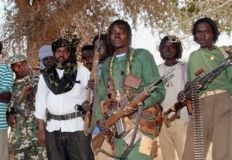Sudan warns rebels world would not wait for long time
November 7, 2007 (CAPE TOWN) — The world will eventually forget the suffering in Darfur unless rival rebel factions unite and join peace talks aimed at ending years of bloodshed and deprivation, a Sudanese state minister said on Wednesday.
 Speaking during a visit by Sudanese President Omar Hassan al-Bashir to South Africa, Sudanese Minister of State for Foreign Affairs Al-Samani al-Wasiyla warned splintered rebel groups “enough is enough”.
Speaking during a visit by Sudanese President Omar Hassan al-Bashir to South Africa, Sudanese Minister of State for Foreign Affairs Al-Samani al-Wasiyla warned splintered rebel groups “enough is enough”.
“They should not prolong the situation in camps for years and years because the international community simply has got a lot of issues and a lot of crises happening in different places in the world every day and every month,” he told Reuters in an interview.
“They are not going to go forever looking at that (Darfur) situation. That’s what history tells us. If they are not going to help themselves who is going to help you? They will lose sympathy.”
Some 200,000 people have died since rebels took up arms in 2003 accusing the central government in Khartoum of neglect. Khartoum says its critics exaggerate the crisis and only 9,000 people have died.
Rebel groups and residents of Darfur have accused the Janjaweed, a predominantly Arab militia allied to the Sudanese government, of killing and raping civilians, and destroying villages. The Sudanese government says militias exist in Darfur but denies allegations it influences the Janjaweed.
MILITIAS ALL AROUND
Darfur faces new challenges as a result of tribal battles and splintering rebel groups, which have complicated efforts to advance the world’s largest humanitarian relief operation.
A 2006 peace agreement signed in Abuja, Nigeria by only one rebel faction triggered more violence as rebels split into more than a dozen groups. Talks hosted by Libya on Oct. 27 ended quickly after three main rebel factions refused to participate.
As divisions deepen, rebel militias dig in. Weapons and cash are readily available in a highly unstable region with few resources the size of France. It’s an atmosphere that makes relief operations riskier by the day.
Wasiyla said a brisk weapons trade from the region and possibly abroad is hard to control. He did not name countries but said it would be easy to trace the flow of arms.
“There is a continuous supply. … Who is doing it? We are not manufacturing arms in Sudan or in Africa,” he said.
Rebels and activists say China is a major supplier of weapons to the government, which find their way to Darfur militias.
“I don’t have certain names. Arms are coming from everywhere. Even if it is manufactured in the West you can buy it from a third party. The international community can trace a transaction of $100.”
Tough issues, meanwhile, don’t go away.
Some rebel groups want possible autonomy for Darfur to be discussed at peace talks, something Wasiyla firmly dismissed.
“With regard to being separate, or self-determination or whatever. It is out of the question,” he said.
Wasiyla said the Khartoum government was prepared to listen to the grievances of any rebel group. But he warned there would be dire consequences for fighters, even ones at the negotiating table, are not committed to a comprehensive political deal.
“Even if they are there and they are not serious enough about reaching an agreement, they are going to be regarded as terrorists and be dealt with in the manner which will keep peace in Darfur,” he said.
(Reuters)
